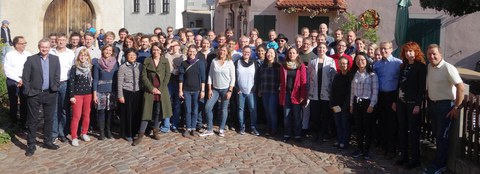May 29, 2020
2D nanomaterials and the control of one's own will: DFG to fund two Collaborative Research Centres at the School of Science
The German Research Foundation (DFG) is funding two Collaborative Research Centres (CRC) at the School of Science, three in total for TU Dresden with a funding of around 29 million euros over the next four years. Whereas the CRC 940 headed by spokesperson Prof. Thomas Goscke is being extended for the second time, Prof. Xinliang Feng is happy about his new CRC 1415 on 2D nanomaterials. The third new CRC at TUD is the CRC/TR 280 "Design strategies for carbon concrete structures using a minimal of material – Fundamentals for a new way of constructing" headed by Prof. Manfred Curbach.
"This is excellent news for TU Dresden and supports the continued development of our university”, says Prof. Hans Müller-Steinhagen, Rector of TU Dresden. "I would like to congratulate the three speakers and their teams from the bottom of my heart and wish them every success in their ambitious endeavours."
Uncovering the mechanisms of volition: CRC 940 "Volition and Cognitive Control: Mechanisms, Modulators, Dysfunctions"
The team of more than 60 psychologists and neuroscientists from the TU Dresden, together with cooperation partners from the Charité Berlin, will continue their effort to elucidate the mechanisms underlying human volition and self-control for another four years.
In the past eight years, CRC researchers have already made substantial progress with respect to their overall goal to elucidate the cognitive and neural mechanisms, which underlie the ability to exert volitional control over one's actions and emotions and to understand determinants of impaired self-control. By combining psychological experiments with advanced functional neuroimaging methods, CRC researchers were able to identify regions of the prefrontal cortex, which mediate the maintenance of intentions and the ability to shield intentions against distracting stimuli or undesired impulsive responses. Moreover, major advances were made in uncovering the neuronal circuits underlying the control of voluntary goal-directed actions as opposed to automated habits. The newly gained insights about the mechanisms of human decision-making and action control have substantially contributed to a better understanding of why individuals often exhibit impaired self-control and make shortsighted decisions in their daily life, which are associated with adverse personal consequences and great societal costs. The spokesperson of the SFB, Prof. Thomas Goschke, attributes the success of the CRC to the fact that it "combines in innovative ways interdisciplinary basic research on neurocognitive mechanisms of volition and self-control with applied themes of high clinical and societal relevance”.
In the third funding period, the researchers will investigate whether dysfunctions of neurocognitive processes underlying impaired self-control predict the long-term risk of addiction and other mental disorders, why self-control is specifically impaired under severe stress, and how such impairments affect social interactions. According to Goschke, the long-term vision is to lay foundations for improved prevention and therapy of disorders of self-control based on insights into the neurocognitive mechanisms of voluntary action control and thereby to provide new impulses for the social and philosophical discourse on freedom of will. https://tu-dresden.de/sfb940
Spokesperson: Prof. Thomas Goschke, TU Dresden
Partners: TU Dresden, Charité Berlin
Funding: ca 10 million EUR
New nanomaterials: CRC 1415 “Chemistry of Synthetic Two-Dimensional Materials”
The economy of the 21st century is enabled and fuelled by advanced materials for electronics and technologies. In this respect, the arena of two-dimensional materials (2DMs) became popular over the last decade, because 2DMs offer great promise in applications ranging from electronic devices to catalysis, and from information technology to medicine. 2DMs represent a class of nanomaterials with single- to few-layers thickness (≤ 10 layers) and high structural definition at the atomic/molecular level.
The Collaborative Research Centre (CRC) 1415 “Chemistry of Synthetic Two-Dimensional Materials” will aim at the controlled bottom-up synthesis and the development of novel classes of synthetic 2DMs with high structural definition. Moreover, the development of in-situ and ex-situ spectroscopic, microscopic and diffraction characterization methods plays a key role. The third focal point of the research initiative is to theoretically tackle the chemical and physical phenomena of 2DMs using advanced theoretical methods and models, and to predict the 2DM’s formation and their physical and chemical properties.
Spokesperson: Prof. Dr. Xinliang Feng, Deputy spokesperson: Prof. Dr. Thomas Heine
Partners: TU Dresden, (cfaed, Chair of Molecular Functional Materials), Helmholtz-Zentrum Dresden-Rossendorf, Leibniz Institute of Polymer Research Dresden, Leibniz Institute for Solid State and Materials Research Dresden, Ulm University
Funding: ca 7.7 million EUR
Media inquiries:
CRC 1415: 2D Materials
Prof. Xinliang Feng (Spokesperson)
Tel.: 0351 463-43251
Prof. Thomas Heine (Deputy spokesperson)
Tel.: 0351 463-37637
,
CRC 940: Volition and Cognitive Control
Prof. Thomas Goschke
Tel.: 0351 463-34695 oder 0172 3554785

